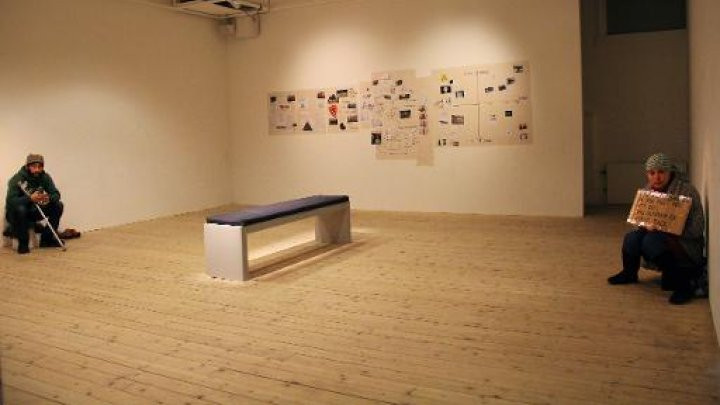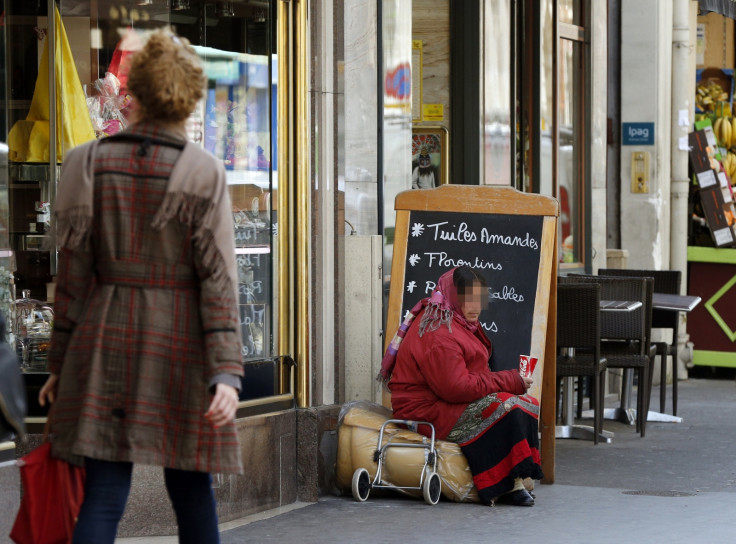MEP slams Swedish Roma Gypsy beggars art display as exploitative 'freak show'

Campaigners have slammed as "disgusting" an art exhibition displaying Roma Gypsy beggars as props.
Soraya Post, a member of the Swedish government-led Commission Against Antiziganism, and a member of the European Parliament, is accusing the organisers of the exhibition, which uses a Roma couple begging, of creating a freak show.
The Swedish artists behind the exhibition at the Malmö Konsthall, one of the city's biggest art exhibition centres, say they meant to raise questions about global inequality but instead find themselves accused of exploiting the poor.
The beggars, who are a couple in real life, appear dressed in thick clothes and are not allowed to talk to visitors. There are an estimated 10,000 Romas in Malmö.
Human beings used as objects
The Roma couple were begging in the streets of the third largest Swedish city of Malmö when members of the Institutet approached them, promising them a salary for being put on display in a municipal museum of contemporary art.
To see the exhibition that launched in January, visitors have to cross a dark corridor, on which screens read: "Today, you do not have to give". The Romanian couple sits silently in dim light in opposite corners of an almost empty room, except for a few newspaper clippings on social problems and soft music in the background.
Post, a member of Sweden's Commission on fighting racism against the local Roma minority, has slammed the decision to "use human beings as objects for their own interest" as "disgusting".
"In 2015, we can expect more from people doing an exhibition than using Romas as objects. It is very disgusting to use these kind of people; people who are enduring enough marginalisation and are already exploited by society," Post told IBTimes UK, linking the art work to the popular Victorian freak shows.
"They have created a freak show, like the ones where the smaller woman or women with beards are shown. It's not acceptable for them to be put there for people to look at their misery."

While the Commission has welcomed the fact the couple was given a salary to take part in the exhibition, it has also condemned the fact they are used as silent actors, "not answering questions or acting as guides".
Instead, Post, who was the first Romani woman in Swedish history to be chosen as a candidate for a political party, believes the organisers could have found better ways of raising awareness on the harsh conditions faced by Romanian immigrants in the European Union.
"Instead, they are justifying the misery in which the Roma find themselves. They are artists, who could have described the Roma struggle in another way."
The MP says organisers should have been in contact with other Roma organisations, to understand the issues and publicise their actions. "Visitors don't need to go inside the exhibition room to see poor people, they can go on the streets, every day on every corner."
€15 per hour
At the museum, Luca Lacatus, a 28-year-old carpenter and his girlfriend, Marcella Cheresi, 26, make approximately 140 kroner per hour (£10.7, €15, $16.2).
For the couple, working for two hours means quadrupling their daily income of 30 to 60 kroner (£2.9 to £5.7, €3 to €6, $3.5 to $7.1).
Lacatus said the money he earns from his work in the exhibit will help to rebuild their house, which he says was burned two years ago. After the incident, the social services took two of his four children – the other two having been taken in by relatives.
While she is pregnant with the couple's first child, Cheresi's two children from a previous marriage are living with her sister.
Lacatus and Cheresi are just two of the estimated 150 Romas begging in Malmö, according to the Roma Association. Begging in legal in Sweden.
© Copyright IBTimes 2025. All rights reserved.





















